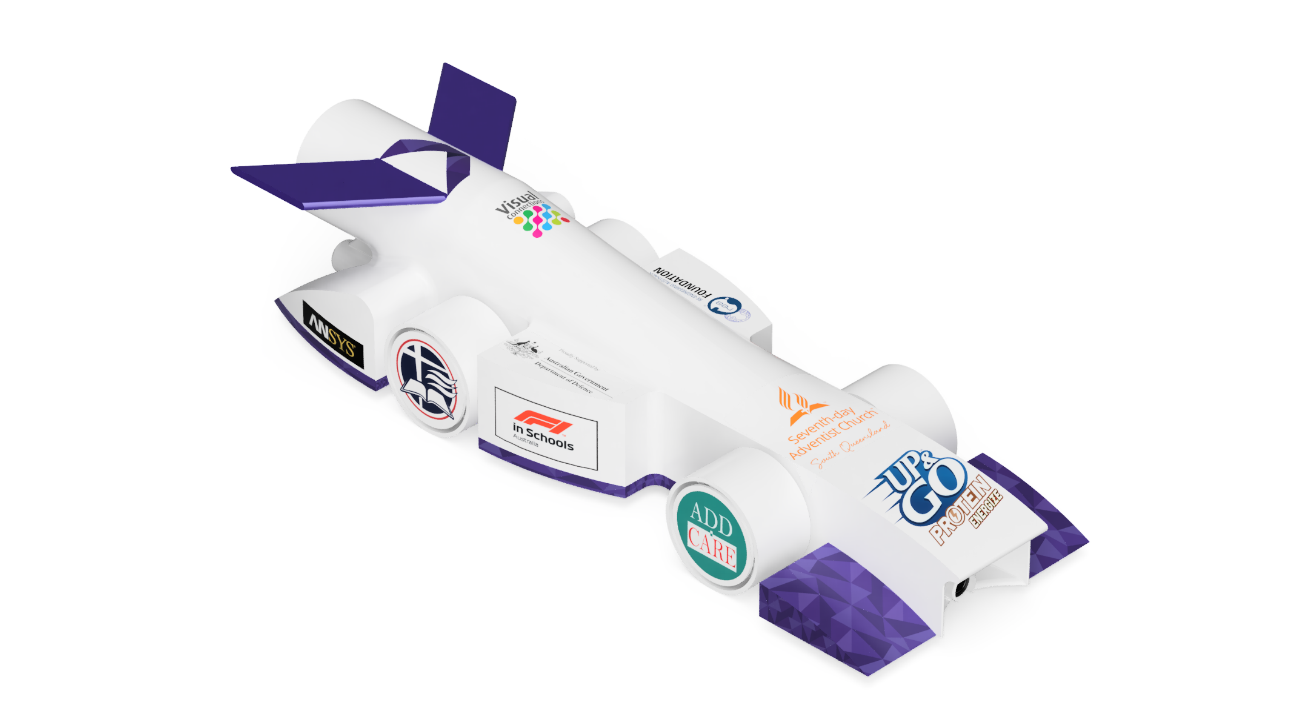We are Dark Matter Racing, an F1 in Schools STEM Challenge team from Gold Coast Christian College. In collaboration with LEAP Australia and using Ansys Discovery AIM, our team was able to engineer Australia’s fastest F1 in Schools car at the 2020 National Final. We also received the Grand Prix, AGCP Fastest Lap, Knock Out Champions, Best Reaction Time and Bosch Enthusiasm Awards. As a team, we are aiming to continually refine and improve our car as we head into our next competition, the 2020(21) World Finals - now rescheduled to 2021 due to the pandemic.

Dark Matter receiving awards at the 2020 F1 in Schools™ National Final in Melbourne.
The F1 in SchoolsTM Challenge is an international STEM competition run by the Re-Engineering Australia (REA) Foundation which internationally involves over 17,000 schools from 44 countries. It is a multidisciplinary educational experience that mimics a real F1 team, requiring a team of 3-6 high school students to collaborate, design, analyse, manufacture, test, and then race miniature cars fuelled by compressed CO2 canisters. As well as this, student teams must also raise sponsorship and manage budgets to fund research, car production, travel, accommodation, and resources. Sponsorship is vital as teams must produce a large trade display, professional engineering and enterprise portfolios, carry out all CAD and CAM design work for their car and provide proof that this work has been carried out solely by team members through a rigorous interview with a panel of industry specialists, as well as launching various social media campaigns. The competition has a strict set of guidelines and rules to which teams must adhere to, and are marked out of 1000 points, of which approximately 600 apply to the engineering and racing of the car itself.
Now in our third year of the competition, we have been blessed by experiencing significant successes in the challenge and, after much hard work and dedication, and with ongoing support from esteemed sponsors such as LEAP Australia, we have been given the opportunity to represent Australia at the World Championship in 2021.

Dark Matter’s 2020 F1 in Schools™ National Final car that received the award of fastest car in Australia.
In order to produce the fastest car possible, Dark Matter partnered with LEAP Australia to support our team in its use of the computational fluid dynamics (CFD) package, Ansys Discovery AIM. Using the simulation software Ansys AIM enabled our team to optimise the performance quality of the physical prototypes we produced. We can now assess how each design iteration will perform in comparison to the other iterations wholly during the CAD design and analysis process, whereas previously we would have had to manufacture all iterations as physical prototypes and assess their respective performances on the track. Ansys AIM allows our team to assess the aerodynamic performance of a higher volume of prototypes, which has saved us valuable resources of time and materials in our preparation for the World Finals.

Design Engineer, Caed Lawson, inspiring young F1 in Schools™ teams through mentoring them in the use Ansys AIM.
With Ansys AIM, our design engineer has been able to re-iterate designs on component parts for a much more detailed product development and optimization. With the aim of breaking the 1 second barrier, our design engineer scrutinizes the simulation for large low-pressure zones, and seeks to reduce them as much as possible.
One of the many tools Ansys AIM allows us to use is assessing the surface pressure, and make design adjustments accordingly. Figure 1 below displays a conventional concaved front wing in simulation at an air velocity of 20 m/s. From the analysis of this information, the team was able to observe a high-pressure zone over the surface of the wing which indicates unnecessary forces, causing drag.

Figure 1: Conventional concaved front wing with pressure analysis in air flow of 20 m/s in Ansys AIM.
This observation enabled further designs to be produced by the team in order to generate a reduction in pressure. After a number of angle iterations, the design engineer found that a convex wing had clear and evidentiary reduction in air pressure over the surface of the front wing in comparison to the other traditional concaved front wing design shapes.

Figure 2: Redesigned front wing with pressure analysis in airflow of 20 m/s in Ansys AIM.
Integrating Ansys AIM into our workflow at the start of 2020 was a seamless process, with the aid of the LEAP Support Team whose guidance in setup procedure and proper analysis of simulations has been invaluable to our team.

The current Dark Matter team that will be competing in the F1 in Schools™ World Championship: (from left) Erin Bennett (Marketing Manager), Caed Lawson (Design Engineer), Sanjay Sabu (Pit Display Engineer), Reynold Chu (Business Manager), Ali Savage (Team Manger) and Indianna Lawson (Graphic Designer).
We thank LEAP Australia & Ansys for their support and look forward to our next journey to the 2021 World Championship!
For more information and to stay in touch with our team, check out our website or @darkmatterracing on Facebook and @darkmatterau on Instagram.






